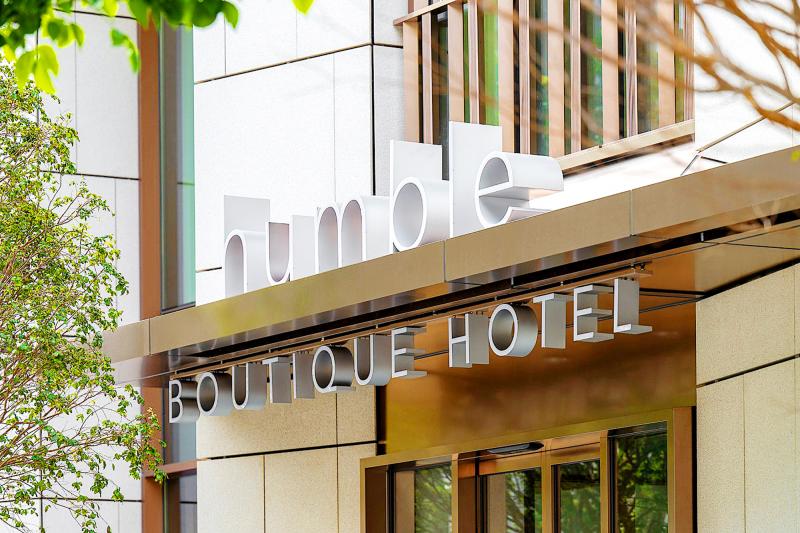Luxury hotel operator My Humble House Hospitality Management Consulting Co (寒舍餐旅) is to launch Humble Boutique Hotel (寒居酒店) in downtown Taipei next week, it said yesterday, unfazed by the COVID-19 pandemic that has driven well-established hotels out of the market.
The joint venture with Continental Development Corp (大陸建設) features 111 guestrooms on the first 10 floors of a 24-story mixed-use complex on Songjiang Road in Zongshan District (中山), it said.
The property’s upper floors are reserved for serviced apartments, which have mostly sold out, Continental Development said.

Photo courtesy of KLOOK
Humble Boutique is to soft open on Saturday next week, and its restaurant BeGood would soft open on April 1, the hotel operator said.
The hospitality group operates Le Meridien Taipei (台北寒舍艾美酒店) and Humble House Taipei (寒舍艾麗) in the city’s prime Xinyi District (信義), Sheraton Grand Taipei Hotel (台北喜來登大飯店) near Taipei Railway Station and hot spring resort Mu Jiaosi Hotel (礁溪寒沐) in Yilan County.
The company let go a number of employees last summer to reduce financial losses that mounted due to a nationwide level 3 COVID-19 alert. The government issued a level 2 alert on May 11 last year before raising it to level 3 on May 19 after the Central Epidemic Command Center reported more than 100 daily domestic cases for the first time since the COVID-19 pandemic began in early 2020.
Leofoo Hotel (六福客棧), Sherwood Taipei (台北西華飯店), Ambassador Hotel Taipei (台北國賓飯店), Imperial Hotel Taipei (台北華國大飯店) and others hotels nearby have exited the market as border controls stopped the flow of foreign tourists.
The government this month eased some local restrictions and those for travelers from abroad amid an improving COVID-19 situation in Taiwan and in consideration of economic factors.

With this year’s Semicon Taiwan trade show set to kick off on Wednesday, market attention has turned to the mass production of advanced packaging technologies and capacity expansion in Taiwan and the US. With traditional scaling reaching physical limits, heterogeneous integration and packaging technologies have emerged as key solutions. Surging demand for artificial intelligence (AI), high-performance computing (HPC) and high-bandwidth memory (HBM) chips has put technologies such as chip-on-wafer-on-substrate (CoWoS), integrated fan-out (InFO), system on integrated chips (SoIC), 3D IC and fan-out panel-level packaging (FOPLP) at the center of semiconductor innovation, making them a major focus at this year’s trade show, according

DEBUT: The trade show is to feature 17 national pavilions, a new high for the event, including from Canada, Costa Rica, Lithuania, Sweden and Vietnam for the first time The Semicon Taiwan trade show, which opens on Wednesday, is expected to see a new high in the number of exhibitors and visitors from around the world, said its organizer, SEMI, which has described the annual event as the “Olympics of the semiconductor industry.” SEMI, which represents companies in the electronics manufacturing and design supply chain, and touts the annual exhibition as the most influential semiconductor trade show in the world, said more than 1,200 enterprises from 56 countries are to showcase their innovations across more than 4,100 booths, and that the event could attract 100,000 visitors. This year’s event features 17

EXPORT GROWTH: The AI boom has shortened chip cycles to just one year, putting pressure on chipmakers to accelerate development and expand packaging capacity Developing a localized supply chain for advanced packaging equipment is critical for keeping pace with customers’ increasingly shrinking time-to-market cycles for new artificial intelligence (AI) chips, Taiwan Semiconductor Manufacturing Co (TSMC, 台積電) said yesterday. Spurred on by the AI revolution, customers are accelerating product upgrades to nearly every year, compared with the two to three-year development cadence in the past, TSMC vice president of advanced packaging technology and service Jun He (何軍) said at a 3D IC Global Summit organized by SEMI in Taipei. These shortened cycles put heavy pressure on chipmakers, as the entire process — from chip design to mass

SEMICONDUCTOR SERVICES: A company executive said that Taiwanese firms must think about how to participate in global supply chains and lift their competitiveness Taiwan Semiconductor Manufacturing Co (TSMC, 台積電) yesterday said it expects to launch its first multifunctional service center in Pingtung County in the middle of 2027, in a bid to foster a resilient high-tech facility construction ecosystem. TSMC broached the idea of creating a center two or three years ago when it started building new manufacturing capacity in the US and Japan, the company said. The center, dubbed an “ecosystem park,” would assist local manufacturing facility construction partners to upgrade their capabilities and secure more deals from other global chipmakers such as Intel Corp, Micron Technology Inc and Infineon Technologies AG, TSMC said. It